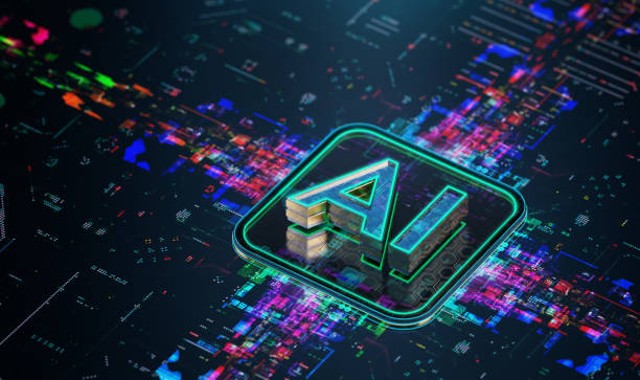Artificial intelligence (AI) has recently emerged as a transformative force, driving the digital transformation of various industries. This includes finance, healthcare, retail, and beyond. As organizations strive to adapt to the changing technology world and meet customers’ expectations, integrating AI-powered solutions has become crucial.
In this blog post, we will explore the impact of artificial intelligence on the digital transformation process, highlighting the key areas where AI is revolutionizing business operations, enhancing customer experiences, and fueling innovation.
READ ALSO: How AI Technology is Reshaping the Workforce
What is Artificial Intelligence?
Artificial intelligence is a field of study that focuses on developing systems and algorithms that can perform tasks typically like human intelligence, such as problem-solving, decision-making, and natural language processing.
READ ALSO: 5 Artificial Intelligence Opportunities for College Students
How does AI impact digital transformation?
Digital transformation is the process of integrating digital technologies into all aspects of a business, fundamentally changing how the organization operates and delivers value to its customers. This transformation is driven by the need to stay competitive, improve efficiency, and meet the expectations of the digital-savvy consumer.
At the intersection of AI and digital transformation, organizations are harnessing the power of artificial intelligence to accelerate and enhance their digital initiatives. By leveraging AI-powered solutions, businesses can streamline operations, personalize customer experiences, and unlock new opportunities for innovation.
READ ALSO: 5 Industries AI Will Disrupt in the Coming Years
The Key Areas of AI’s Impact on Digital Transformation
1. Intelligent Automation
Artificial intelligence is playing a crucial role in digital transformation. This can be seen in how AI is driving intelligent automation across various business processes. Through the integration of technologies like robotic process automation (RPA), machine learning, and natural language processing, organizations can automate repetitive and rule-based tasks. This has a way of improving efficiency and reducing the risk of human error. Some ways AI impacts through automation include:
a. Streamlined Operations
AI-powered automation can help organizations streamline their operations by automating tasks such as data entry, document processing, and routine administrative activities. This frees up employees to focus on more strategic and value-added work, leading to increased productivity and cost savings.
b. Enhanced Decision-Making
AI-powered decision-making systems can analyze large datasets, identify patterns, and make informed decisions with greater speed and accuracy than traditional manual processes. This helps organizations improve their decision-making capabilities, especially in areas such as risk management, investment portfolio optimization, and customer segmentation.
c. Improved Customer Experience
AI-enabled automation can enhance customer experiences by providing faster responses, personalized recommendations, and seamless interactions across various touchpoints. Chatbots, virtual assistants, and intelligent customer service systems can handle routine inquiries, freeing up human agents to focus on more complex or high-value customer interactions.
READ ALSO: Workflow Automation Tools: The Best for Busy Remote Teams
2. Personalized Customer Experiences
Artificial intelligence is revolutionizing the way organizations deliver personalized customer experiences. By leveraging data analytics, machine learning, and natural language processing, businesses can gain deeper insights into customer behavior, preferences, and needs, enabling them to provide tailored products, services, and interactions. Some ways AI personalizes customer experiences include:
a. Personalized Product Recommendations
AI-powered recommendation engines can analyze customer data, such as browsing history, purchase patterns, and demographic information, to provide personalized product and service recommendations. This helps organizations increase customer engagement, cross-sell and upsell opportunities, and improve customer satisfaction.
b. Predictive Maintenance and Support
AI-enabled predictive analytics can help organizations anticipate and address customer needs before they arise. By monitoring customer usage patterns and proactively identifying potential issues, businesses can provide preemptive maintenance, personalized support, and predictive maintenance solutions, enhancing the overall customer experience.
c. Hyper-Personalized Marketing
Artificial intelligence enables organizations to create highly personalized marketing campaigns and communication strategies. By analyzing customer data and leveraging machine learning algorithms, businesses can deliver targeted, relevant, and timely messages, advertisements, and offers to their customers, resulting in improved customer engagement and conversion rates.
READ MORE: Top 7 Unique Ways A.I Can Improve Customer Service
3. Intelligent Decision-Making and Forecasting
AI-powered systems are transforming how organizations make strategic decisions and forecast future trends. By processing and analyzing vast amounts of data, AI can uncover hidden patterns, identify risk factors, and generate accurate predictions to support more informed decision-making. Some ways AI makes intelligent decision-making include:
a. Predictive Analytics
Artificial intelligence and advanced analytics can help organizations develop predictive models to forecast market trends, consumer behavior, and business performance. These predictive insights enable organizations to make more informed decisions, optimizing their strategies and resource allocation to stay ahead of the competition.
b. Risk Management and Mitigation
AI-powered risk management systems can analyze complex data sets, identify potential risks, and recommend mitigation strategies. This helps organizations proactively manage financial, operational, and regulatory risks, reducing the impact of unexpected events and ensuring business continuity.
c. Intelligent Planning and Forecasting
AI-driven planning and forecasting systems can leverage historical data, market information, and real-time analytics to generate accurate predictions and projections. This empowers organizations to make more informed strategic decisions, optimize resource allocation, and adapt to changing market conditions.
READ ALSO: Digital Transformation Lessons Learned From Excellent Set-up
4. Enhanced Cybersecurity and Fraud Detection
As digital transformation accelerates, organizations face a growing threat of cyber-attacks and financial fraud. Artificial intelligence is playing a crucial role in strengthening cybersecurity measures and improving fraud detection capabilities. Some ways AI enhances Cybersecurity and fraud detection include:
a. Proactive Threat Detection and Response
AI-powered cybersecurity solutions can continuously monitor network activity, identify anomalies, and detect potential cyber threats in real time. By leveraging machine learning algorithms, these systems can adapt and evolve, enabling organizations to respond to emerging threats more effectively and minimize the impact of cyber-attacks.
b. Automated Fraud Prevention
AI-based fraud detection systems can analyze transaction patterns, customer behavior, and other data points to identify potentially fraudulent activities. These intelligent systems can flag suspicious transactions, enable real-time fraud prevention, and reduce the financial and reputational impact of fraud on organizations.
c. Improved Identity and Access Management
Artificial intelligence is enhancing identity and access management (IAM) by incorporating biometric authentication, such as facial recognition and voice recognition. These AI-powered IAM systems can provide more secure and convenient access controls, preventing unauthorized access and strengthening an organization’s cybersecurity posture.
READ ALSO: Cybersecurity tips and tricks: How to stay safe online
5. Innovative Product and Service Development
Artificial intelligence is not only transforming the way organizations operate but also enabling them to develop innovative products and services that meet the needs of customers. Some ways AI makes an impact on innovative product and service development are:
a. AI-Powered Product Innovation
By leveraging AI-driven insights and data analysis, organizations can identify new market opportunities, uncover unmet customer needs, and develop innovative products and services. This helps them stay ahead of the competition and deliver greater value to their customers.
b. Intelligent Assistants and Chatbots
AI-powered virtual assistants and chatbots are revolutionizing the way customers interact with organizations. These intelligent systems can provide personalized support, answer queries, and assist customers in completing tasks, enhancing the overall user experience and driving customer engagement.
c. Autonomous and Intelligent Systems
Artificial intelligence is enabling the development of autonomous and intelligent systems that can operate with minimal human intervention. From self-driving vehicles to AI-powered decision-making systems, these innovations are transforming various industries and opening up new possibilities for businesses to enhance their offerings and create competitive advantages.
READ ALSO: Benefits of cloud computing for small businesses: Best 10
6. Improved Supply Chain and Logistics Management
Artificial intelligence is transforming the way organizations manage their supply chain and logistics operations. It is improving efficiency, agility, and resilience. Some ways AI improves supply chain and logistics management include:
a. Predictive Supply Chain Planning
AI-powered predictive analytics can help organizations forecast demand, optimize inventory levels, and streamline supply chain operations. By analyzing data from various sources, including sales, supplier performance, and market trends, AI-enabled systems can identify patterns and make informed decisions to minimize disruptions and improve supply chain efficiency.
b. Autonomous Logistics and Delivery
AI-powered autonomous systems, such as self-driving vehicles and drone technology, are revolutionizing the logistics and delivery industry. These intelligent systems can optimize routes, automate transportation, and provide real-time visibility, enhancing the speed, accuracy, and cost-effectiveness of last-mile delivery and logistics operations.
c. Supply Chain Risk Mitigation
Artificial intelligence can help organizations identify and mitigate supply chain risks. By analyzing data from various sources, including sensor data, weather patterns, and geopolitical events, AI-powered systems can predict and alert organizations to potential disruptions, enabling them to take timely action to minimize the impact on their operations.
READ ALSO: Digital transformation in finance Industry: Trends and innovations
7. Improved Operational Efficiency and Cost Optimization
Artificial intelligence is enabling organizations to enhance their operational efficiency and optimize costs across various business functions. Some ways AI improves operational efficiency and cost optimization include:
a. Process Automation and Optimization
AI-powered automation and process optimization can help organizations streamline their workflows, reduce manual errors, and improve productivity. By automating repetitive tasks and identifying areas for improvement, AI can help businesses enhance their overall operational efficiency and free up resources for more strategic initiatives.
b. Resource Allocation and Workforce Planning
AI-driven analytics and decision-making systems can assist organizations in optimizing their resource allocation and workforce planning. By analyzing data on employee performance, skills, and workload, AI can help organizations make more informed decisions about staffing, training, and task assignments, leading to improved productivity and cost savings.
c. Predictive Maintenance and Asset Management
Artificial intelligence can revolutionize asset management and maintenance processes. By leveraging sensor data, historical maintenance records, and machine learning algorithms, AI-powered systems can predict equipment failures, recommend preventive maintenance schedules, and optimize asset utilization, reducing downtime and maintenance costs.
READ ALSO: Cloud Efficiency: Tips and Tricks On How To Maximize It
What are the challenges of adopting AI?
While the benefits of integrating artificial intelligence into digital transformation initiatives are clear, organizations also face several challenges and considerations when adopting AI-powered solutions. The challenges and considerations in adopting AI for digital transformation are as follows:
1. Data Quality and Availability
Effective AI implementation requires access to high-quality, comprehensive data. Organizations must ensure that their data is accurate, complete, and properly structured to train and deploy AI models effectively. Addressing data-related challenges, such as data silos and data governance, is crucial for successful AI integration.
READ ALSO: Benefits of Data Visualization And Why Is a Top Data Skill
2. Ethical and Responsible AI
As AI systems become more sophisticated and pervasive, concerns around ethical implications and responsible AI practices have become important. Organizations must address issues such as algorithmic bias, privacy, and transparency to ensure that their AI-powered solutions are aligned with ethical and regulatory standards.
3. Talent and Skill Development
Successful adoption of AI for digital transformation requires specialized skills and expertise in areas such as data science, machine learning, and AI engineering. Attracting and retaining talent with these capabilities can be a significant challenge for many organizations, and investing in employee upskilling and training is essential.
4. Integration and Scalability
Integrating AI-powered solutions into existing digital infrastructure and ensuring seamless interoperability can be a complex and time-consuming process. Organizations must also consider the scalability of their AI initiatives as their needs and data volumes grow, ensuring that their AI systems can adapt and scale accordingly.
READ ALSO: B2B Digital Marketing Trends and Great Techniques to Stay Ahead
5. Change Management and Organizational Readiness
Implementing AI-driven digital transformation initiatives requires a cultural shift within the organization. Addressing resistance to change, fostering a data-driven mindset, and ensuring organizational readiness are critical factors in the successful adoption and integration of AI-powered solutions.
Conclusion
Artificial intelligence has emerged as a powerful enabler of digital transformation. It is driving innovation, enhancing operational efficiency, and transforming how organizations interact with their customers. By leveraging the capabilities of AI, businesses can streamline their operations, personalize customer experiences, and unlock new opportunities for growth and competitive advantage.







